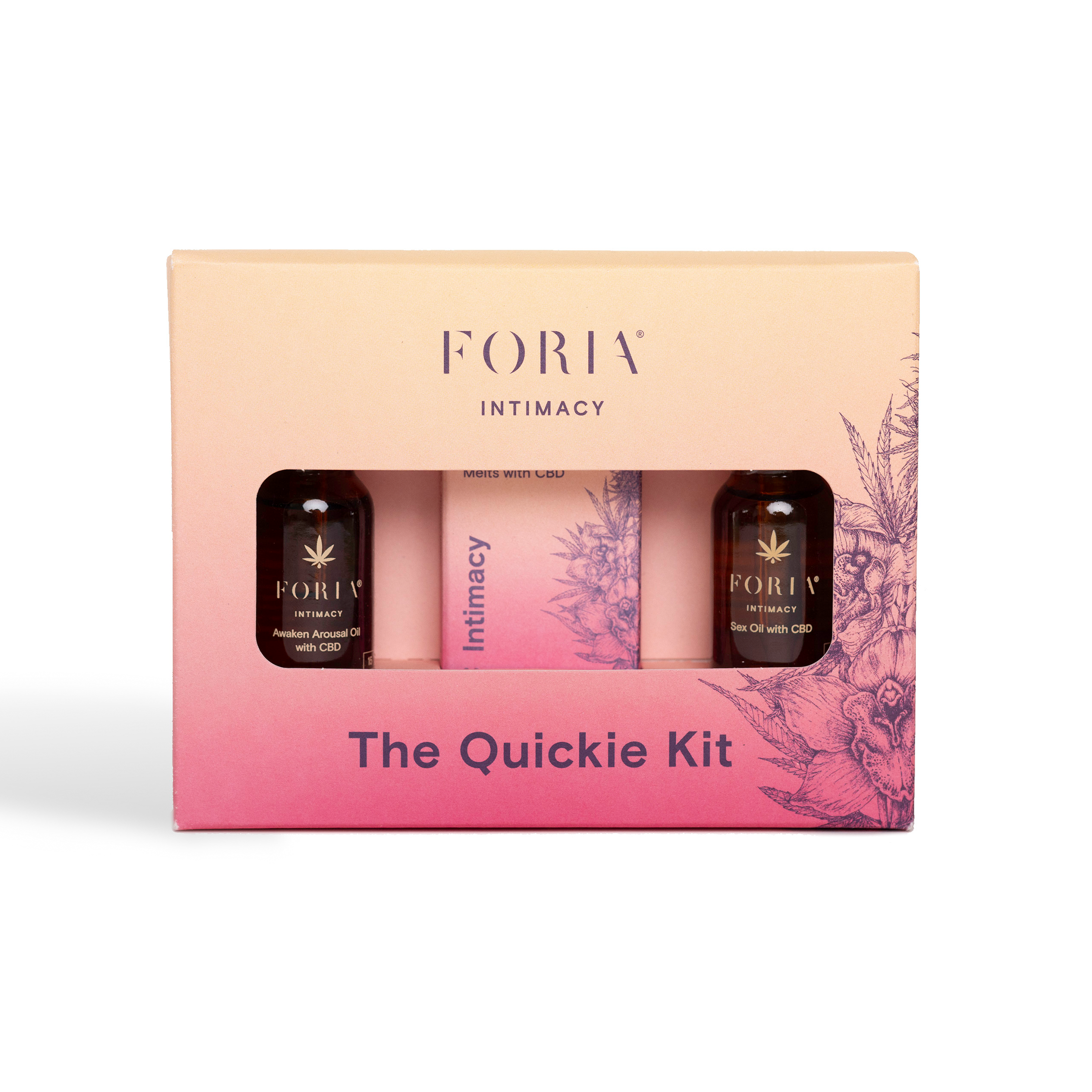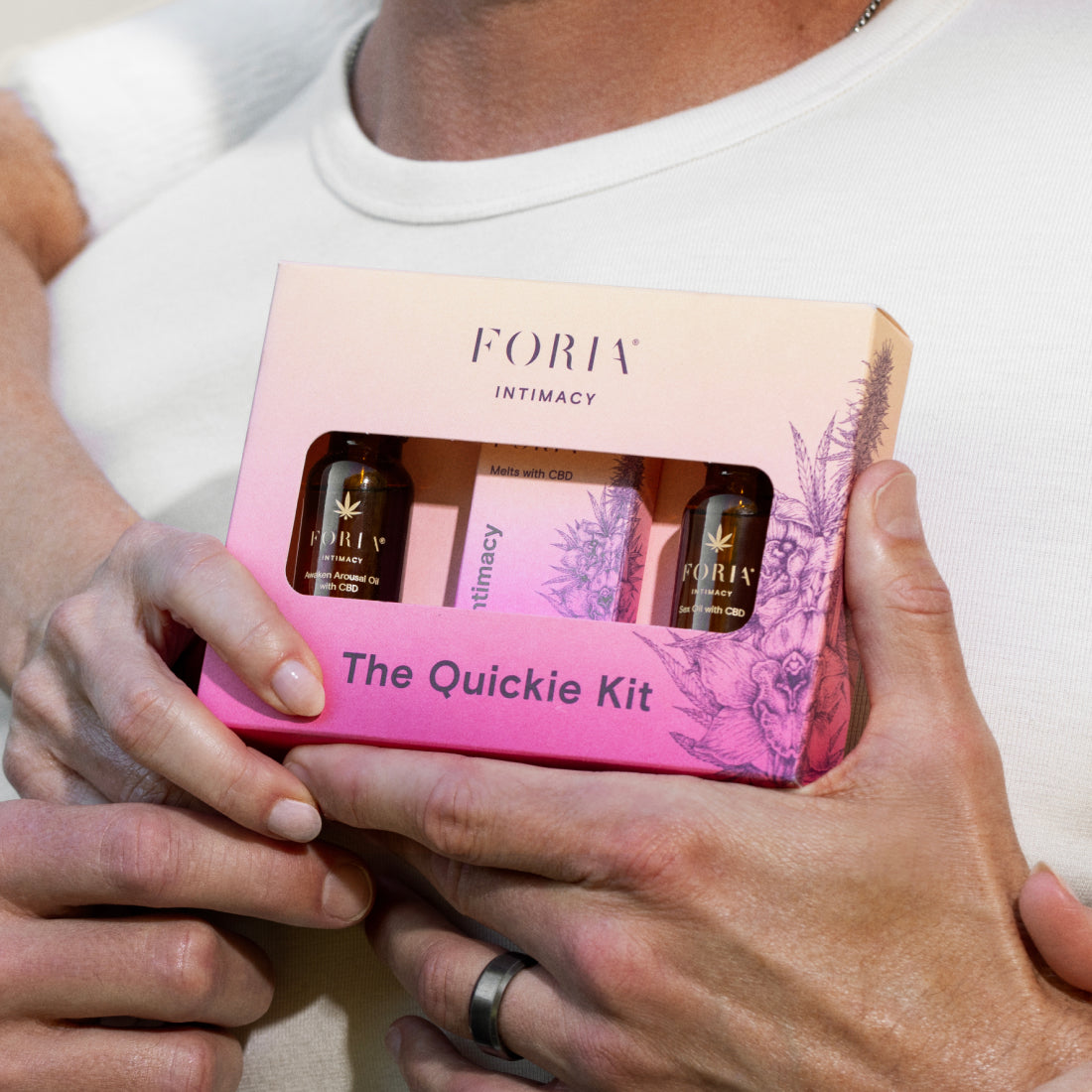- What's the story with coconut oil and sex?
- Can you use coconut oil as lube?
- Can you put coconut oil on your vagina? Will it cause a yeast infection?
Sex Science: Is Coconut Oil Good in Bed?
One of the simplest ways to enhance your sex life is to find — and always keep handy — a lubricant you love. However, not all personal lubricants were created equally, and each one comes with benefits and downsides.
Coconut oil has bedside status for countless women and is a staple ingredient in many natural lubricants (including our Sex Oil with CBD). But if you’ve been trying to figure out if it’s right for you by reading articles and reviews, you’re likely confused...
Everyone can agree that coconut oil lube feels blissful, but some people describe it as a perfectly pH-balanced cure-all for your vagina, while others claim it’s a recipe for disaster. And nobody can reference actual data to back their claims.
Whom should you trust? To be honest, neither camp has it quite right.
In this article, you’ll find out what we actually know about using coconut oil in the bedroom — and unlike those other articles, we’ve got links directly to the published scientific research.
Read on to learn the facts to help you decide if coconut oil should be your new favorite lubricant. (Spoiler alert: We think you’re going to love it!)
Your Vagina: A Delicate Balance of Bacteria
If you already know how natural bacteria keep vaginas acidic and healthy, feel free to skip this section.
Behind every healthy vagina is a healthy community of hard-working bacteria: vaginal flora. Understanding this simplifies how we decide what should — and should not — be put in our bodies.
Similar to gut bacteria, the microbes in our vaginas can keep us healthy or make us sick. That’s why people take probiotics — in the hopes of populating their digestive tracts with the “good guys.” And for most of us, our vaginas’ V.I.P. bacteria are Lactobacilli — which you’re probably familiar with if you eat yogurt or take probiotics.
These little workers convert natural starches (glycogen) in our vaginas into lactic acid, which keeps the pH low (acidic) and prevents malicious microbes from gaining a foothold in the community. Women without strong populations of Lactobacillus suffer more frequently from bacterial vaginosis (sometimes known as “BV”).
Anything that affects your flora could disrupt your vagina’s natural balance: antibiotics, chemical preservatives, your own shifting hormones, unfamiliar bacteria on shared adult toys or on a new partner’s skin.
That’s why some women get vaginal infections after taking antibiotics, getting intimate with a new partner, or re-enacting the ice cream scene from Fifty Shades of Grey. (By the way...Don’t put sugar in your vagina!)
The claims about coconut oil as lube
The internet is overflowing with claims about what happens when you put coconut oil on your private parts.
To help sort through the nonsense, here’s a list of some of the most common things people say about using coconut oil for sex, with a deep dive into what the science actually says.
Here’s what we found:
“Coconut oil increases your risk for a vaginal infection” — UNSUPPORTED
There’s nothing wrong with cautionary speculation: Some people warn that coconut oil could lead to an infection by changing your vagina’s flora.
We’ll talk about that possibility later — along with how it’s equally plausible that coconut oil could help your vagina ward off infections.
Either way, nobody knows because it hasn’t actually been tested yet.
However, we’ve seen websites — quoting gynecologists — claiming that oil absolutely increases your chance of a vaginal infection...up to 8 times more!
But anyone who regularly enjoys coconut oil in the bedroom knows that is untrue and absurd! So we hunted down the original research paper and here's a quick summary of what we found:
Researchers interviewed and tested 141 women for two different types of vaginal infections: Bacterial vaginosis (BV) and candidiasis (yeast infection). Only 11 women reported putting oil in their vaginas, with an emphasis on “baby oil” — a perfumed petroleum product. Of these 11 oil-using women, 5 also tested positive for candidiasis. Nowhere in this paper were natural plant-based oils mentioned.
The researchers themselves state that too few women were tested to draw any real conclusions about oil and yeast infections.
The real culprit might not be “oil” as much as “synthetics.” Perfumed products (including fragrant laundry detergents) are a frequent culprit behind unhappy vaginas.
So anyone who actually reads this paper will quickly see it has zero relevance to the coconut-oil-as-lube debate.
One thing we can say with confidence is that oral sex increases your susceptibility to yeast infections. If you’ve gotten a yeast infection after using coconut oil in the past, perhaps it was because it made you taste so darn good?
Lubricants that have been linked to infections:
- Using Vaseline in your vagina increases your risk for bacterial vaginosis (BV)
- Water-based lubes with high osmolality increase your risk for contracting STDs
Coconut oil is anti-bacterial” — NOPE
This is another topic that both sides get wrong. People often summon the antibacterial properties of lauric acid (a component in coconut oil) to claim that coconut oil will either kill off good bacteria or fight against bad bacteria. Here’s the logical progression that sounds right, but is missing a key point:
- Lauric acid (a fatty acid) is antibacterial — numerous experiments have confirmed this finding.
- Coconut oil is ~50% lauric acid.
- Therefore coconut oil is antibacterial. Right? Absolutely not!
The missing key point has to do with what we already discussed about oil virginity. To rephrase: If you’re using a higher quality virgin oil, all those antibacterial fatty acids will be safely bound up in triglycerides where they won’t be harming any bacteria.
That’s why published studies on this topic generally report the same thing: Although lauric acid by itself inhibits bacteria, virgin coconut oil is completely harmless to a broad variety of bacteria.
- Side note about oil pulling: Many people find that swishing coconut oil in their mouths for 10-20 minutes a day helps improve their oral health — reducing plaque and gingivitis. But don’t listen to those claiming it kills mouth bacteria. Research suggests that, instead of being antibacterial, plant oils help break up (emulsify) plaque.
“Coconut oil is antifungal” — POSSIBLY
First off, just to be clear: Antibacterial and antifungal are very different things. For instance, if you have BV (bacterial vaginosis), your doctor will prescribe an antibiotic, whereas if you have a yeast infection, you’ll need to use an antifungal. Different things.
Not only is lauric acid antifungal, but research suggests that virgin coconut oil could also be antifungal. If that proves true, then either yeast is more susceptible than bacteria to the low concentrations of free lauric acid in virgin coconut oil, or other components of coconut oil are also antifungal.
More anecdotal evidence backing this claim is the large number of women who testify that coconut oil cures their yeast infections. Although we don’t advise this remedy (there are probably more effective options), it is a widespread natural alternative.
“Coconut oil can change your vaginal flora” — UNTESTED
Although fresh, virgin coconut oil probably won’t kill off the bacteria in your vagina, we can’t say for sure whether or not it will feed other microbes. Coconut oil stays fresh for months at room temperature, and bacteria or molds that eat it are uncommon and grow very, very slowly. That said, each of us has a unique vaginal flora, and you may have drawn the short straw.
Just as you and I differ in our ability to digest foods (because we have different gut microbes), our vaginas are different in their ability to handle what we put in them. Nobody can say for sure what coconut oil will do to your flora — it hasn’t been tested, and you will have a highly individual experience.
However, every lubricant (including saliva!) could potentially affect your microbes. Bacterial communities keep vaginas healthy, and just like finding the best diet for your unique gut bacteria, you’ll want to sample around before choosing the best lube for your vag. That said, coconut oil’s widespread use as a natural remedy for yeast infections is proof that coconut oil could help sway the flora in a good direction — even if it might also move some women’s in the wrong direction.
“Don’t use coconut oil with latex condoms” — TRUE!
One last important point: You shouldn’t use coconut oil with latex condoms, but that’s not coconut oil’s fault. It has to do with the chemical properties of oil in general — whether that’s a natural plant-based or synthetic petroleum-based oil.
How bad is it? Scientists tested this question in the lab by soaking condoms in different lubricants and then inflating them while counting how long it takes for them to burst. Without lubrication, condoms last about a minute. What destroys condoms? Baby oil was the worst of the bunch, popping the condom after only 11 seconds. But other mineral oils and vegetable oils also weakened the condoms.
Scientists also tested this question in the bedroom by instructing hundreds of couples to have sex a dozen times using different combinations of condoms and lubes. This experiment found that oil-based lubricants increase breakage - although it was not statistically significant. Overall, the evidence is pretty strong that oil and latex don’t mix.
But for those of us who aren’t chained to condoms, coconut oil could be the perfect all-natural and preservative-free sex lube.
A few research-based condom tips:
- Yeast infection treatments and vaginal moisturizers can also weaken condoms — use backup methods whenever you’re applying these to your vagina and the package doesn’t say “condom-safe.”
- Water-based lubricants decrease the breakage rate of “aged” condoms. So if you’re digging at the bottom of your drawer for an old condom, make sure to lather on the water-based lube!
When to skip the coconut oil
Latex condoms: Yes we just said this, but seriously, latex condoms and oil DO NOT MIX. If you’re choosing between the two, condoms take priority over coconut oil. And when using condoms, beware that oil on your vulva or even in the opposite hole might compromise the protection. Silicone-based lubricants are a great option if you dislike the stickiness of water-based lubes.
Plastic sex toys: Not all toys are oil-compatible. Pure silicone toys (even the wiggly ones) should be all right, but keep oil away from mystery plastic toys. In fact, you should probably keep mystery plastics out of your body. But if you absolutely crave skin-soft toys, they’re safest when paired with a condom and water-based lube. In general, the softer the plastic, the quicker that oil will destroy it.
Coconut allergy: This is probably intuitive, but if you have an allergic reaction when eating coconuts, you should skip trying out coconut oil as lube. Another highly recommended natural lubricant is olive oil - try that instead!
Coconut Oil as a Lube: Tips for First-Timers
- Before bringing it to the bedroom, first test coconut oil on the sensitive skin of your inner forearm. Two days later, try a little in — and around — your vagina. If all goes well, it’s time to have some fun!
- Use only unexpired, high-quality coconut oil as a lubricant. If it’s discolored or tastes sour, it’s time to get a new jar.
- Keep coconut oil fresh and contamination-free by using small containers. Don’t get it wet and avoid finger-dipping.
- You might want to lay out a towel to protect your sheets from oil spots. But if you end up with oil on your bedding or underwear, don’t worry - it’ll come off in the washing machine with hot water and detergent. You can also pre-treat with baking soda to soak up the oil before washing.
More articles by: Genevieve R. Moore PhD
Featured in this article
The Quickie Kit
Introductory kit featuring deluxe mini sizes of our three Intimacy CBD best-sellers
$44Want more? Sign up for our newsletter
By entering your email, you are agreeing to our terms and conditions and understand our privacy policy.











